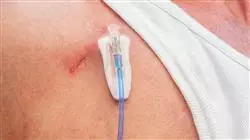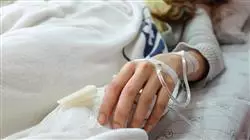University certificate
The world's largest faculty of medicine”
Introduction to the Program
This training will provide you with a sense of security in medical practice, which will help you grow personally and professionally”

Cancer patients, on many occasions, present pathologies associated with the oncological process or not, but which require attention and care. One example is cardiovascular pathologies, such as arterial hypertension or venous thromboembolic disease.
The specialist plays a fundamental role in the approach to the oncological process, and his or her diagnostic and therapeutic orientation must be in harmony with those of the rest of the pathologies suffered by the patient.
Cardiovascular involvement is commonly present in the side effects of most treatments for the oncology patient. The management of the medication, as well as of other therapeutic options, is fundamental in the adjustment of the appropriate dosage for medical praxis. Keeping up to date with advances in arterial hypertension and venous thromboembolic disease in oncology patients is a fundamental skill that physicians must possess in their daily clinical practice.
This program is designed to facilitate the specialist's updating process, so that he/she can include in the clinical practice of their patients all the innovations and the latest knowledge about oncological therapeutics.
Update your knowledge with the Postgraduate diploma in Systemic Cardiovascular Disease and Complex Clinical Situations in the Oncologic Patient"
The Postgraduate diploma in Systemic Cardiovascular Disease and Complex Clinical Situations in the Oncologic Patient contains the most complete and up to date scientific program on the market. The most important features of the program include:
- Development of case studies presented by experts on hypertension and venous thromboembolic diseases in cancer patients. The graphic, schematic, and eminently practical contents with which they are created provide scientific and practical information on the disciplines that are essential for professional practice
- New developments in arterial hypertension in the oncology patient
- It contains practical exercises where the self-evaluation process can be carried out to improve learning
- With special emphasis on innovative methodologies in arterial hypertension and venous thromboembolic disease
- All of this will be complemented by theoretical lessons, questions to the Postgraduate diploma, debate forums on controversial topics, and individual reflection assignments
- Content that is accessible from any fixed or portable device with an Internet connection
This Postgraduate diploma may be the best investment you can make in the selection of a refresher program for two reasons: in addition to updating your knowledge in Systemic Cardiovascular Disease and Complex Clinical Situations in the Oncologic Patient, you will obtain a Postgraduate diploma from TECH Global University"
Its teaching staff includes professionals from the field of hypertension and venous thromboembolic disease in cancer patients, who bring to this training the experience of their work, as well as renowned specialists from prestigious reference societies and universities.
The multimedia content developed with the latest educational technology will provide the professional with situated and contextual learning, i.e., a simulated environment that will provide immersive training program to train in real situations.
The design of this program is based on Problem-Based Learning, by means of which the student must try to solve the different professional practice situations that arise throughout the course. To this end, the student will be assisted by an innovative interactive video system developed by recognized experts in the field of cardiovascular pathology in oncology, with extensive teaching experience.
Increase your decision-making confidence by updating your knowledge through this specialist course"

Make the most of this opportunity to learn about the latest advances in the approach to cardiovascular pathologies in oncology, and improve the care of your patients"
Why study at TECH?
TECH is the world’s largest online university. With an impressive catalog of more than 14,000 university programs available in 11 languages, it is positioned as a leader in employability, with a 99% job placement rate. In addition, it relies on an enormous faculty of more than 6,000 professors of the highest international renown.

Study at the world's largest online university and guarantee your professional success. The future starts at TECH”
The world’s best online university according to FORBES
The prestigious Forbes magazine, specialized in business and finance, has highlighted TECH as “the world's best online university” This is what they have recently stated in an article in their digital edition in which they echo the success story of this institution, “thanks to the academic offer it provides, the selection of its teaching staff, and an innovative learning method aimed at educating the professionals of the future”
A revolutionary study method, a cutting-edge faculty and a practical focus: the key to TECH's success.
The most complete study plans on the university scene
TECH offers the most complete study plans on the university scene, with syllabuses that cover fundamental concepts and, at the same time, the main scientific advances in their specific scientific areas. In addition, these programs are continuously being updated to guarantee students the academic vanguard and the most in-demand professional skills. In this way, the university's qualifications provide its graduates with a significant advantage to propel their careers to success.
TECH offers the most comprehensive and intensive study plans on the current university scene.
A world-class teaching staff
TECH's teaching staff is made up of more than 6,000 professors with the highest international recognition. Professors, researchers and top executives of multinational companies, including Isaiah Covington, performance coach of the Boston Celtics; Magda Romanska, principal investigator at Harvard MetaLAB; Ignacio Wistumba, chairman of the department of translational molecular pathology at MD Anderson Cancer Center; and D.W. Pine, creative director of TIME magazine, among others.
Internationally renowned experts, specialized in different branches of Health, Technology, Communication and Business, form part of the TECH faculty.
A unique learning method
TECH is the first university to use Relearning in all its programs. It is the best online learning methodology, accredited with international teaching quality certifications, provided by prestigious educational agencies. In addition, this disruptive educational model is complemented with the “Case Method”, thereby setting up a unique online teaching strategy. Innovative teaching resources are also implemented, including detailed videos, infographics and interactive summaries.
TECH combines Relearning and the Case Method in all its university programs to guarantee excellent theoretical and practical learning, studying whenever and wherever you want.
The world's largest online university
TECH is the world’s largest online university. We are the largest educational institution, with the best and widest online educational catalog, one hundred percent online and covering the vast majority of areas of knowledge. We offer a large selection of our own degrees and accredited online undergraduate and postgraduate degrees. In total, more than 14,000 university degrees, in eleven different languages, make us the largest educational largest in the world.
TECH has the world's most extensive catalog of academic and official programs, available in more than 11 languages.
Google Premier Partner
The American technology giant has awarded TECH the Google Google Premier Partner badge. This award, which is only available to 3% of the world's companies, highlights the efficient, flexible and tailored experience that this university provides to students. The recognition as a Google Premier Partner not only accredits the maximum rigor, performance and investment in TECH's digital infrastructures, but also places this university as one of the world's leading technology companies.
Google has positioned TECH in the top 3% of the world's most important technology companies by awarding it its Google Premier Partner badge.
The official online university of the NBA
TECH is the official online university of the NBA. Thanks to our agreement with the biggest league in basketball, we offer our students exclusive university programs, as well as a wide variety of educational resources focused on the business of the league and other areas of the sports industry. Each program is made up of a uniquely designed syllabus and features exceptional guest hosts: professionals with a distinguished sports background who will offer their expertise on the most relevant topics.
TECH has been selected by the NBA, the world's top basketball league, as its official online university.
The top-rated university by its students
Students have positioned TECH as the world's top-rated university on the main review websites, with a highest rating of 4.9 out of 5, obtained from more than 1,000 reviews. These results consolidate TECH as the benchmark university institution at an international level, reflecting the excellence and positive impact of its educational model.” reflecting the excellence and positive impact of its educational model.”
TECH is the world’s top-rated university by its students.
Leaders in employability
TECH has managed to become the leading university in employability. 99% of its students obtain jobs in the academic field they have studied, within one year of completing any of the university's programs. A similar number achieve immediate career enhancement. All this thanks to a study methodology that bases its effectiveness on the acquisition of practical skills, which are absolutely necessary for professional development.
99% of TECH graduates find a job within a year of completing their studies.
Postgraduate Diploma in Systemic Cardiovascular Involvement and Complex Clinical Situations in the Oncology Patient
Systemic cardiovascular involvement and complex clinical situations in the oncology patient constitute a fundamental area of study in the field of medicine. In this context, the interaction between cancer and the cardiovascular system can generate a series of clinical challenges that require a specialized approach. Based on this, TECH Global University has developed its Postgraduate Diploma in Systemic Cardiovascular Affectation and Complex Clinical Situations in the Oncology Patient. An online postgraduate course created with the highest academic standards that will complement your studies in a dynamic and flexible way. Through the syllabus, carefully designed by a team of experts, you will gain a solid theoretical foundation, learning the key pathophysiological mechanisms underlying the relationship between cancer and cardiovascular disease. You will explore the influence of cancer treatments (chemotherapy, radiotherapy), on the cardiovascular system, and understand how to address cardiovascular complications arising from these treatments.
You will learn about systemic cardiovascular involvement and complex clinical situations.
This Postgraduate Diploma is a proposal of voluminous, but dynamic content devised by TECH as a way to update your skills in the face of the new demands of the labor market. Within the respective training, we offer you both online classes that you can manage under your own time availability, as well as a diverse interactive agenda that encompasses the most relevant aspects of this field. As you progress through the program, you will learn how to evaluate and diagnose cardiovascular involvement in oncology patients, using advanced imaging techniques and specific tests. In addition, you will be trained in the comprehensive management of cardiovascular complications, including prevention, pharmacological treatment and invasive interventions when necessary. At the end of the Postgraduate Certificate, you will be prepared to confidently face complex clinical situations involving oncology patients with cardiovascular involvement.







